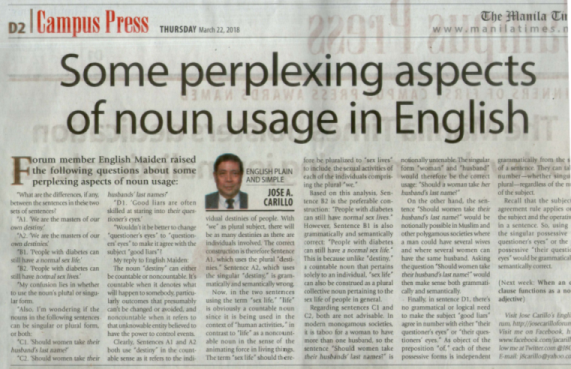Forum member English Maiden raised the following questions about some perplexing aspects of noun usage:
“What are the differences, if any, between the sentences in these two sets of sentences?
“A1. ‘We are the masters of
our own destiny.’
“A2. ‘We are the masters of
our own destinies.’
“B1. ‘People with diabetes can still have a
normal sex life.’
“B2. ‘People with diabetes can still have
normal sex lives.’
“My confusion lies in whether to use the noun’s plural or singular form.
“Also, I’m wondering if the nouns in the following sentences can be singular or plural form, or both:
“C1. ‘Should women take
their husband’s last name?’
“C2. ‘Should women take
their husbands’ last names?’
“D1. ‘Good liars are often skilled at staring into
their questioner’s eyes.’
“Wouldn’t it be better to change “questioner’s eyes” to “questioners’ eyes” to make it agree with the subject “good liars”?
My reply to English Maiden:
The noun “destiny” can either be countable or noncountable. It’s countable when it denotes what will happen to somebody, particularly outcomes that presumably can’t be changed or avoided, and noncountable when it refers to that unknowable entity believed to have the power to control events.
Clearly, Sentences A1 and A2 both use “destiny” in the countable sense as it refers to the individual destinies of people. With “we” as plural subject, there will be as many destinies as there are individuals involved. The correct construction is therefore Sentence A1, which uses the plural “destinies.” Sentence A2, which uses the singular “destiny,” is grammatically and semantically wrong.
Now, in the two sentences using the term “sex life,” “life” is obviously a countable noun since it is being used in the context of “human activities,” in contrast to “life” as a noncountable noun in the sense of the animating force in living things. The term “sex life” should therefore be pluralized to “sex lives” to include the sexual activities of each of the individuals comprising the plural “we.”
Based on this analysis, Sentence B2 is the preferable construction: “People with diabetes can still have
normal sex lives.” However, Sentence B1 is also grammatically and semantically correct: “People with diabetes can still have
a normal sex life.” This is because unlike “destiny,” a countable noun that pertains solely to an individual, “sex life” can also be construed as a plural collective noun pertaining to the sex life of people in general.
Regarding sentences C1 and C2, both are not advisable. In modern monogamous societies, it is taboo for a woman to have more than one husband, so the sentence “Should women take
their husbands’ last names?” is notionally untenable. The singular form “woman” and “husband” would therefore be the correct usage: “Should a woman take
her husband’s last name?”
On the other hand, the sentence “Should women take
their husband’s last name?” would be notionally possible in Muslim and other polygamous societies where a man could have several wives and where several women can have the same husband. Asking the question “Should women take
their husband’s last name?” would then make sense both grammatically and semantically.
Finally, in sentence D1, there’s no grammatical or logical need to make the subject “good liars” agree in number with either “their questioner’s eyes” or “their questioners’ eyes.” As object of the preposition “of,” each of these possessive forms is independent grammatically from the subject of a sentence. They can take any number—whether singular or plural—regardless of the number of the subject.
Recall that the subject-verb agreement rule applies only to the subject and the operative verb in a sentence. So, using either the singular possessive “their questioner’s eyes” or the plural possessive “their questioners’ eyes” would be grammatically and semantically correct.
 This essay, 1084th in the series, appeared in the column “English Plain and Simple” by Jose A. Carillo in the Campus Press section of the March 22, 2018 issue (print edition only) of
This essay, 1084th in the series, appeared in the column “English Plain and Simple” by Jose A. Carillo in the Campus Press section of the March 22, 2018 issue (print edition only) of The Manila Times
, © 2018 by the Manila Times Publishing Corp. All rights reserved.(Next week:
When an entire clause functions as a noun or adjective)